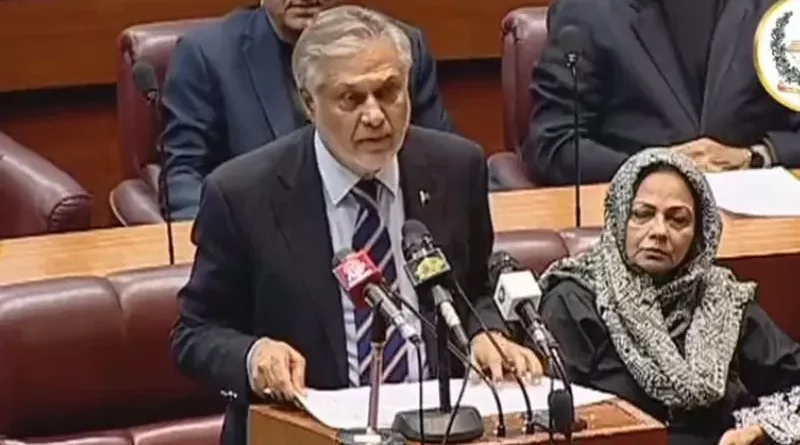Pak Govt presents ‘mini-budget’ to unlock $1.1bn IMF loan
Minister for Finance and Revenue Senator Ishaq Dar Wednesday introduced the Finance (Supplementary) Bill 2023 or the “mini-budget” in the National Assembly and Senate as the government sought to fulfil the prerequisites for unlocking the $1.1 billion International Monetary Fund (IMF) loan tranche.
Running against time to pacify the IMF for the revival of the bailout programme, the government last night approved hiking the general sales tax (GST) rate from 17% to 18% and increasing the Federal Excise Duty (FED) on cigarettes in order to fetch an additional Rs115 billion out of Rs170 billion agreed to by Pakistan in line with the IMF conditions.
Through the “mini-budget”, the Pakistan Democratic Movement (PDM)-led government aims to reduce the budget deficit and broaden its tax collection net — in order to meet the conditions laid forth by the Washington-based lender.
The National Assembly will not be sending the bill for further deliberations to the Standing Committee on Finance and Revenue, while the Senate has referred the legislation to the relevant committee.
Proposals
Increase in GST on luxury items from 17% to 25%
FED on business and first-class air tickets be increased to Rs20,000 or 50% — whichever is higher
10% withholding adjustable advance income tax to be imposed on marriage halls
Increase in FED on cigarettes, soft and sugary drinks
FED on cement to be raised from Rs1.5 kg to Rs2 kg
Increase in GST from standard 17% to 18%
GST to not be imposed on essential goods — wheat, rice, milk, pulses, vegetables, fruits, fish, eggs, meat
BISP stipend to be increased; govt to allocate Rs400 billion for programme
Talking to reporters after the session, Finmin Dar said that he expects the bill to be passed in both houses by Monday or Tuesday as Senate Chairman Sadiq Sanjrani has “given us till Friday”.
Pakistan and the IMF could not reach a deal last week and a visiting IMF delegation departed Islamabad after 10 days of talks but said negotiations would continue. The $350 billion economy is in dire need of funds as it battles a wrenching economic crisis.
In a bid to appease the IMF, the government sought to roll out the fiscal measure through an ordinance, but President Dr Arif Alvi advised the administration to seek parliament’s consent instead.
An agreement on the ninth review of the programme would release over $1.1 billion of the total $2.5 billion pending as part of the current package agreed upon in 2019 which ends on June 30. The funds are crucial for the economy whose current foreign exchange reserves barely cover 18 days’ worth of imports.
In his address to the lower house of parliament, FinMin Dar said that the “nation is facing unprecedented crises” due to the Pakistan Tehreek-e-Insaf (PTI) government’s “substandard” policies.
The country, during the Pakistan Muslim League-Nawaz’s (PML-N) previous government, had witnessed economic development and the gross domestic product (GDP) had increased by $112 billion.
“The PML-N always tries to take fewer loans. Foreign investment had also increased during the PML-N tenure. In contrast, during the PTI government, the loans hit record highs, and a common man’s income also plunged.”
The finance czar went on to say that apart from overcoming the “challenges that the present government faces due to PTI’s policies”, last year’s floods had also incurred losses worth more than $8 billion.
“But, we should always prefer the state over politics,” he reiterated — the mantra that PDM leaders have time and again propagate as they face an uphill task on the economic front.

